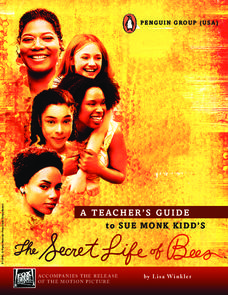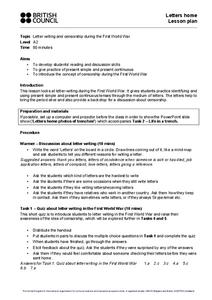PBS
Stories of Painkiller Addiction: Decisions and Consequences
Teach young learners that most drug addictions end in one of three outcomes: treatment, jail, or death. After watching a short video segment on the consequences of drug abuse, class members discuss what they viewed and consider what...
PBS
Stories of Painkiller Addiction: The Brain on Autopilot
For some people, the force of addiction can be as biologically compelling as the drive for food or water. High schoolers watch a video segment about Ryan, a recovering addict, and learn more about how opioids and other drugs can affect...
PBS
Stories of Painkiller Addiction: Prescription Drug Abuse Awareness Campaign
The I-STOP law was designed to regulate the distribution and tracking of prescription drugs. After reading an article about its signing and implementation, middle and high schoolers work together to come up with their own ideas for an...
PBS
Stories of Painkiller Addiction: Contemplating Nature vs. Nurture
Does having an addict in your family make it more likely to become one yourself? Explore the genetic risk factors, as well as the prominent environmental influences, for substance addiction in a lesson that encourages awareness and open...
US National Library of Medicine
Drug Use and Abuse: Past and Present
Pick your poison: tobacco, alcohol, opiates, cocaine, or marijuana. An online exhibition launches a research project that asks groups to select one of the five drugs and gather information on how the use of the drug and the regulations...
The New York Times
Investigating the Heroin and Prescription Opioid Epidemic
How bad is the opioid crisis in America? Has it gotten worse in the last few decades? Why? High schoolers delve into these questions with a thorough and thoughtful lesson from The New York Times on heroin prescription opioids. Starting...
Scholastic
Presenting Persuasively (Grades 9-12)
As a review of persuasive techniques, groups develop a one-sentence slogan designed to entice others to purchase a produce or adopt a point of view. The group then craft a storyboard for a commercial for their product.
Penguin Books
A Teacher's Guide to Sue Monk Kidd's: The Secret Life of Bees
A 12-page teacher's guide to Sue Monk Kidd's The Secret Life of Bees provides the discussion questions and activities that lead readers to understand not only Lily's fears, but her reasons behind them.
Cancer Care
What is Breast Cancer?
How gets breast cancer? What are the hereditary risk factors? Can individuals reduce their risk factors? If you are looking for a resource to use during October's in Breast Cancer Awareness Month, check out the lessons in this packet.
Education World
Public Speaking Lesson: The Impact of Bullying
It's one thing to prevent yourself from becoming a bully, but how do you convince others to follow suit? Take the first step in creating a better world with a public speaking lesson plan that prompts learners to write and present...
Towson University
Mystery Tubes
How do scientists know they're right? Truth be told, they don't always know. Explore the scientific process using mystery tubes in an insightful activity. Young scientists discover how to approach and solve problems in science, how ideas...
Museum of Tolerance
Documents That Shape Society
The Bill of Rights is a foundational document of American democracy, much like the Nuremberg Laws were a foundational document of the Reichstag of Nazi Germany. But that's where their similarities end. Engage high schoolers in a...
ReadWriteThink
Defining Literacy in a Digital World
What skills are necessary to interact with different types of text? Twenty-first century learners live in a digital world and must develop a whole new set of skills to develop media literacy. Class members engage in a series of...
Fluence Learning
Writing an Argument: Free Speech
How do you assess whether pupils have mastered certain concepts and skills? Designing a performance task that asks learners to demonstrate their skills and providing writers with a rubric that identifies these skills and provides...
Fluence Learning
Writing About Literature: Nature in the Writings of John Muir and Emily Dickinson
As an assessment of their skill in crafting a compare and contrast essay, class members read and compare the portrayals of nature in excerpts from naturalist John Muir's My First Summer in the Sierra and from poet Emily Dickinson's "The...
Fluence Learning
Writing About Informational Text: Political Parties
To demonstrate their ability to craft an analysis of informational text, class members read excerpts from James Madison's "The Federalist No. 10," from George Washington's Farewell Address, and from Thomas Jefferson's First Inaugural...
Fluence Learning
Writing About Informational Text: The Dred Scott Decision
Looking for a performance assessment that asks individuals to demonstrate their competency in writing about informational text? Use Frederick Douglass' essay "On the Dred Scott Decision," and an excerpt from Abraham Lincoln's 1857 speech...
British Council
Letters Home
When you're writing historical fiction, the past really can become the present — especially if you're writing in the present continuous tense! Cover World War I, verb tenses, censorship, and letter writing with one informative...
Curated OER
Fear, and Conquering Fear
The Lord of the Flies and The Kite Runner are the core texts in a unit that asks learners to examine various texts that show how fear can be a destructive force or it can be an agent of change. Individuals they design a project that...
Scholastic
Persuasive Communication (Grades 9–12)
Before your students reached your morning class to learn about persuasive writing, they probably saw dozens of examples of persuasive communication in the form of advertisements. A short, introductory lesson inspires class members to...
Administrative Office of the US Courts
US v. Alvarez
Is it illegal to lie about military service? Discuss the ways the First Amendment affects the Stolen Valor Act with a lesson that focuses on the Supreme Court case U.S. v. Alvarez. As high schoolers learn more about the history of the...
Administrative Office of the US Courts
Texas v. Johnson
Which right does the Constitution weigh more heavily: the sanctity of the American flag as a symbol of national unity, or the right to burn the flag in protest? The 1989 Supreme Court case of Texas v. Johnson explores a state's right to...
Learning to Give
Your Place in the Community
Learners identify their beliefs and values and compare how these values relate to those of their community. They then determine how their values affect the roles they play in different situations. A quiz about values and beliefs...
Administrative Office of the US Courts
Snyder v. Phelps
Does the Westboro Baptist Church have the protection of the Constitution when protesting military funerals? High schoolers examine the 2011 Supreme Court case of Snyder v. Phelps before comparing the situation to a fictional scenario of...

























